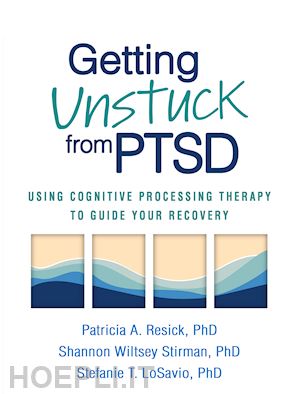Patricia A. Resick, PhD, ABPP, is Professor of Psychiatry and Behavioral Sciences at Duke University Medical School. Dr. Resick began developing and testing cognitive processing therapy (CPT) in 1988 at the University of MissouriSt. Louis, where she founded the Center for Trauma Recovery and was an Endowed Professor. CPT is considered a first-line therapy for posttraumatic stress disorder in the United States and several other countries; the CPT treatment manual has been translated into 12 languages. Dr. Resick has served as president of the International Society for Traumatic Stress Studies (ISTSS) and the Association for Behavioral and Cognitive Therapies (ABCT). She is a recipient of Lifetime Achievement awards from ISTSS, ABCT, and Division 56 (Trauma Psychology) of the American Psychological Association, among other honors. Shannon Wiltsey Stirman, PhD, is Associate Professor in the Department of Psychiatry and Behavioral Sciences at Stanford University. She has been working with people with posttraumatic stress disorder (PTSD) and conducting research on PTSD since the early 2000s. Dr. Wiltsey Stirman provides training and consultation in cognitive processing therapy and cognitive-behavioral therapy and studies their effectiveness and their implementation in public mental health settings. She has a particular interest in developing digital mental health tools and other approaches to make effective treatment more widely available outside the context of traditional therapy. Stefanie T. LoSavio, PhD, ABPP, is Assistant Professor in the Department of Psychiatry and Behavioral Sciences at the University of Texas Health Science Center at San Antonio and Associate Director of the STRONG STAR Training Initiative. Dr. LoSavio specializes in evidence-based treatments for posttraumatic stress disorder (PTSD) and co-occurring conditions. She is a national cognitive processing therapy trainer and has provided consultation for numerous research trials and training initiatives. Her research focuses on the effectiveness of interventions for PTSD and adaptations to treatments and training methods to increase the reach of evidence-based care.











